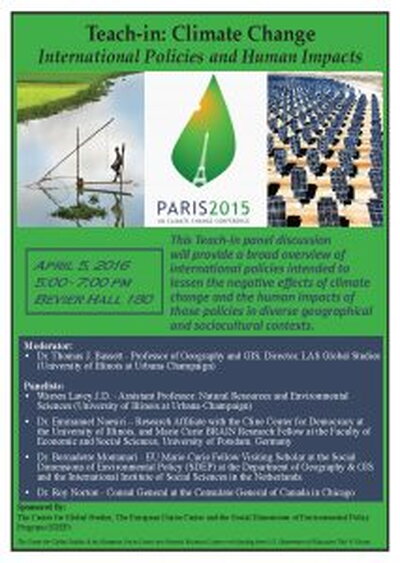
This Teach-in panel discussion on April 5, 2016, provided a broad overview of international policies intended to lessen the impact of climate change and the human impacts of those policies in diverse geographical and sociocultural contexts.
[VIDEO]

Dr. Thomas Basset moderated a panel discussion with University of Illinois faculty and a distinguished guests that share a mutual interest in climate change public policy.
Dr. Lavey discussed the Paris Climate Agreements in December 2015 which highlighted global concerns and commitments to reduce greenhouse gases. His analysis highlighted the long way we have to to go to meet human health and welfare needs, especially for low income populations. In developed as well as developing countries, actions to mitigate and adapt to climate change must be integrated into plans across sectors and stakeholders.
Dr. Nuesiri examined the inclusion of climate change mitigation initiatives such as the reducing emissions from deforestation and forest degradation in developing countries plus the role of conservation, sustainable management of forest and the enhancement of carbon stocks’ (REDD+) in the 2015 Paris Climate Agreement This would have some negative impact on the livelihood of poor forest dependent communities. This panel contribution, based on research in Nigeria and Cameroon, highlighted the likely negative impacts of this climate change mitigation initiative and efforts being made to protect the interests of local people in would be affected communities.
Dr. Montanar described her case study research of the role of rural women’s traditional ecological knowledge in the Green Moroccan Plan. The Green Moroccan Plan (2008-2020) is applying its agricultural policies from the wide open spaces to the most remote areas of the country to overcome poverty and to develop the agricultural economic sector. Dr Montanari ‘s research explores whether these policies allow women to gain social status and economic development in the rural areas. Her study is policy-relevant and aims to establish the gender dimension more prominently in government and donor policies and programmes so as to improve the working conditions of rural women in Morocco.
Consul General Norton commented on Canadian leadership on climate change in the context of Canada-U.S. energy and environmental integration
Moderator:
Dr. Thomas J. Bassett – Professor of Geography and GIS, Director, LAS Global Studies (University of Illinois at Urbana-Champaign)
Panelists:
Dr. Warren Lavey – Assistant Professor; Natural Resources and Environmental Sciences (University of Illinois at Urbana-Champaign)
Dr. Emmanuel Nuesiri – Research Affiliate with the Cline Center for Democracy at the University of Illinois, and Marie Curie BRAIN Research Fellow at the Faculty of Economic and Social Sciences, University of Potsdam, Germany
Dr. Bernadette Montanari – EU Marie-Curie Fellow Visiting Scholar at the Social Dimensions of Environmental Policy (SDEP) at the Department of Geography & GIS and the International Institute of Social Sciences in the Netherlands.
Dr. Roy Norton – Consul General at the Consulate General of Canada in Chicago